The five Cave games we want most on Steam
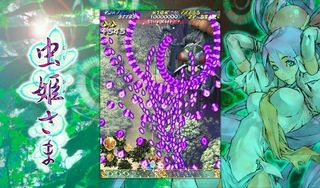
Traditional arcade scrolling shooters have been coming back into vogue for a while now. Late last month, fans of the genre were excited to hear that games from Cave, the most well-loved (and Guiness-certified) producer of the 'danmaku' (bullet hell) shooter subgenre, would be getting the Steam treatment via Degica.
The first arcade port, announced this week, will be the beloved Mushihimesama, an atmospheric arcade adventure from 2004 featuring the young Princess Reco and her giant flying golden beetle Kiniro. It’s exciting to see these games finally reaching a mass worldwide market via the PC, and Cave’s massive back library of such titles means that there’s a lot more to look forward to if Mushihimesama takes off. Here are five of Cave’s best titles that we’d like to see ported onto Steam.
Mushihimesama Futari
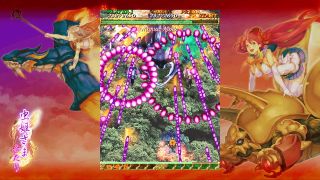
Is it too early to ask for the sequel to the game Cave’s porting to Steam? When it’s as good as Mushihimesama Futari is, it absolutely isn't. Mushihimesama Futari adds a new character, the wyvern-riding Palm, as the duo go through more beautiful environments while fighting a rampaging dinosaur army. How cool does that sound? The sequel does away with a few of the original’s more obtuse mechanics, like power-up swapping, and gives the game an easier-to-grasp scoring system as well. Futari already has a gorgeous HD version on the Xbox 360 done by ace porting house M2, so hopefully a further PC port won’t be too difficult.
You might also remember a video of this last boss circulating a while back. Yep, this is the game.
ESPrade
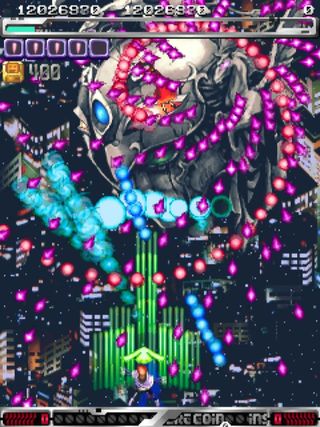
ESPrade is one of Cave’s earlier games, dating from 1998, and one of the few that’s never been ported outside of arcades in any form. It follows three psychic-powered children in a superpowered conflict over a near-future Tokyo, battling military machines, police forces, and a bizarre army of clones lorded over by the powerful madwoman Lady Garra. There’s a tremendous amount of detail poured into this game that really makes it stand out from the pack of arcade shooters, along with a great soundtrack and some truly memorable boss encounters. It’s time for this classic to finally get the proper port it deserves.
Espgaluda
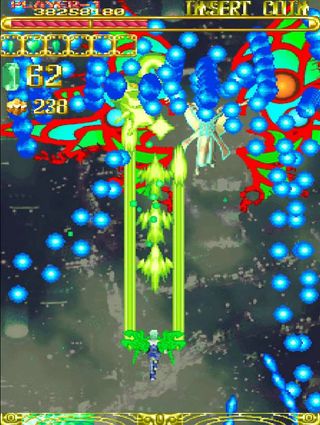
Something of a spiritual successor to ESPrade, Espgaluda is actually very different. It eschews the Tokyo setting for a steampunk-fantasy aesthetic, filled with clockwork machinery and bright pastel colors. While it’s still filled with plenty of bullet trails to dodge, Espgaluda is one of the better entry-level games in the Cave library thanks to its “Awakening” system: defeating enemies yields green bonus gems that can be used to switch on Awakening, which causes all bullets onscreen to slow to a crawl and become easier to dodge until the gems’ energy depletes. Awakening can be used strategically to get through tough areas, or used in high-score runs to 'herd' bullets onscreen for big bonuses once their originating enemy gets blown to bits. A combination of gorgeous visuals, great music, and superb gameplay systems make Espgaluda a game well worth a second life.
Ketsui
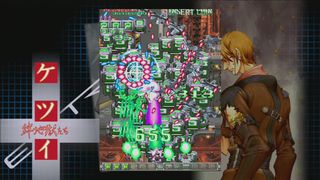
Among all the games in the Cave library, Ketsui is one of the most challenging—and the most beloved. In a techno-industrial near-future, a group of four pilots take on a suicide mission to destroy the warmongering EVAC corporation (get it?). The mission by no means easy—the challenge ramps up from the second level in the game, and you’ll need to complete all of the stages twice over (in hard and extra hard variations) in order to see the game’s real ending. The real treat, however, is the complex scoring system, which has you carefully using your shots and homing lasers at specific times and shooting enemies at point-blank range to reap tremendous bonuses. Whether playing for score or just trying to survive, Ketsui is a thrill.
The biggest gaming news, reviews and hardware deals
Keep up to date with the most important stories and the best deals, as picked by the PC Gamer team.
Dodonpachi
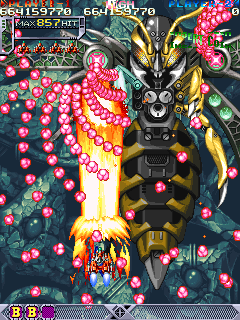
If Cave has a defining title, then Dodonpachi is undoubtedly it. This 1997 release codified many of the conventions that have come to define the bullet hell subgenre: lots of little enemies to bust up, memorable bosses with tricky patterns, and, of course, bullets blanketing the screen in tightly designed waves. Compared to many of their later games, however, Dodonpachi is considerably more accessible. There aren’t too many complex controls or gameplay systems to get a grasp on: you’ll just pick your ship, pick your weapon emphasis (shot or laser), and start shooting. Scoring is easy to understand (chain enemies and find hidden bonuses), the stages are well-designed and follow a good difficulty curve, and it's just plain fun. Dodonpachi is a true classic that undoubtedly deserves the Steam treatment.
Most Popular

